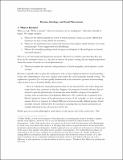Racism, Ideology, and Social Movements
Author(s)
Haslanger, Sally
Downloadhaslanger_res_philosophica_final.pdf (257.3Kb)
OPEN_ACCESS_POLICY
Open Access Policy
Creative Commons Attribution-Noncommercial-Share Alike
Terms of use
Metadata
Show full item recordAbstract
Racism, sexism, and other forms of injustice are more than just bad attitudes; after all, such injustice involves unfair distributions of goods and resources. But attitudes play a role. How central is that role? Tommie Shelby, among others, argues that racism is an ideology and takes a cognitivist approach suggesting that ideologies consist in false beliefs that arise out of and serve pernicious social conditions. In this paper I argue that racism is better understood as a set of practices, attitudes, social meanings, and material conditions, that systematically reinforce one another. Attitudes play a role, but even the cognitive/affective component of ideologies should include culturally shared habits of mind and action. These habits of mind distort, obscure, and occlude important facts about subordinated groups and result in a failure to recognize their interests. How do we disrupt such practices to achieve greater justice? I argue that this is sometimes, but not always, best achieved by argument or challenging false beliefs, so social movements legitimately seek other means.
Date issued
2017-01Department
Massachusetts Institute of Technology. Department of Linguistics and PhilosophyJournal
Res Philosophica
Publisher
Res Philosophica
Citation
Haslanger, Sally. “Racism, Ideology, and Social Movements.” Res Philosophica 94, 1 (2017): 1–22 © 2017 Sally Haslanger
Version: Author's final manuscript
ISSN
2168-9105